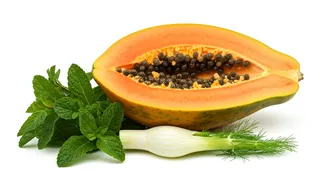Peppermint’s Soothing Touch
Peppermint is renowned for its capacity to calm the digestive system. It contains compounds that can soothe the muscles of the digestive tract. This action
facilitates the passage of gas and reduces bloating. Peppermint tea or peppermint oil capsules are popular ways to benefit. Research suggests peppermint oil can relax the gut muscles. This helps reduce spasms and discomfort often associated with bloating. Incorporating peppermint into your routine might ease bloating symptoms effectively. Remember to consume it in moderation and consult a healthcare professional before making any significant dietary changes, especially if you have pre-existing health conditions or are on medication. Peppermint’s natural properties can provide a gentle yet effective way to manage bloating.
Ginger's Digestive Aid
Ginger is another powerful ally in the fight against bloating. It has anti-inflammatory and antioxidant properties that help ease digestive discomfort. Ginger speeds up the movement of food through the stomach. This prevents the buildup of gas. Consuming ginger, either fresh, in tea, or in supplement form, can improve digestion and reduce bloating. Ginger can also mitigate nausea and vomiting, common symptoms associated with digestive issues. Its effectiveness stems from its ability to relax the intestinal muscles. This allows for smoother movement of food and gas. Regular consumption may provide noticeable relief. However, start with small amounts to gauge your body's reaction. Ginger's natural compounds provide a potent and accessible way to manage bloating.
Fennel Seeds for Gas
Fennel seeds are a traditional remedy for digestive issues. They are particularly effective in easing gas and bloating. These seeds contain compounds that relax the intestinal muscles. This helps release trapped gas. Chewing fennel seeds after meals is a common practice. This can stimulate digestion and prevent bloating. Fennel seeds are also beneficial for reducing inflammation in the digestive tract. They may promote a healthy gut environment. Integrating fennel seeds into your diet—perhaps as a tea or an ingredient in your cooking—could lead to noticeable improvements in digestive comfort. Their natural properties make them a useful tool for managing bloating.
Chamomile’s Calming Effect
Chamomile is well-known for its calming and anti-inflammatory properties. It can soothe the digestive system. Drinking chamomile tea can relax the stomach muscles, thus reducing spasms and bloating. Chamomile helps by decreasing intestinal inflammation. This can reduce the sensitivity that leads to bloating. The tea also eases anxiety, which can worsen digestive issues. Chamomile is a gentle option that can improve digestive comfort and promote a sense of overall well-being. Consuming chamomile is an effective way to relieve symptoms of bloating. It's best enjoyed as a warm, relaxing tea after meals or at the end of the day.
Turmeric's Anti-Inflammation
Turmeric, particularly the compound curcumin, possesses potent anti-inflammatory effects. Inflammation can cause bloating. Turmeric can combat this. Curcumin reduces inflammation in the gut, thereby reducing discomfort. The anti-inflammatory actions of turmeric can also improve overall gut health. Consuming turmeric, whether in curries, smoothies, or supplements, could relieve bloating. For better absorption, it's often combined with black pepper. This spice enhances curcumin's effectiveness. Incorporating turmeric into your daily diet is an accessible method to fight bloating naturally. This provides long-term health benefits, especially in maintaining a healthy digestive system.
Papaya’s Digestive Enzymes
Papaya contains enzymes like papain that aids in digestion. Papain assists in breaking down proteins, which makes digestion easier and reduces bloating. By facilitating efficient digestion, papaya minimizes the potential for gas and bloating. Eating fresh papaya or taking papaya enzyme supplements can offer benefits. Regular consumption of papaya is effective for improving digestive comfort and overall gut health. The natural enzymes in the fruit help the body process food. This contributes to better nutrient absorption. Integrating papaya into your daily routine is a delicious and effective method for combating bloating. It's a natural way to support healthy digestion.
Pineapple and Bromelain
Pineapple contains bromelain, another enzyme similar to papain, known for its digestive benefits. Bromelain also breaks down proteins. This reduces bloating. It also has anti-inflammatory properties, lessening gut inflammation. Consuming pineapple or bromelain supplements can significantly ease bloating symptoms. The enzyme's ability to help in protein digestion reduces the likelihood of gas. Regularly incorporating pineapple into your diet can lead to better digestion. It also contributes to overall gut health. Pineapple’s refreshing taste and health benefits make it a great option. Make sure to consult with a health professional before taking bromelain supplements, particularly if you're on blood-thinning medications.
Bananas for Potassium
Bananas, rich in potassium, can help combat bloating. They help regulate fluid balance in the body, which reduces bloating. Bananas can prevent water retention, which often causes abdominal swelling. The potassium in bananas is important for healthy muscle function, as it supports the normal operation of the digestive tract. Eating a banana can give relief from bloating quickly. The natural sugars in bananas provide energy. This also contributes to their positive effects on digestion. Bananas are a convenient and healthy snack. They provide essential nutrients. They are effective in reducing bloating.
Asparagus: Natural Diuretic
Asparagus acts as a natural diuretic. It can help reduce water retention and bloating. It promotes the excretion of excess fluids from the body. It supports the health of the urinary system. Asparagus also has prebiotics, that benefit gut health. This can improve digestion and reduce bloating. By eliminating extra fluids, asparagus reduces bloating. This can lead to a more comfortable feeling. You can steam, grill, or roast asparagus. It's a versatile and flavorful vegetable. It can enhance any meal. Adding asparagus to your diet can aid in reducing bloating. This promotes overall digestive health.
Yogurt and Probiotics
Yogurt contains probiotics, or beneficial bacteria. They promote gut health and can aid digestion. Probiotics balance the gut microbiome. They help in reducing bloating. By improving the balance of gut bacteria, yogurt can also improve the absorption of nutrients. It can prevent the overgrowth of harmful bacteria. Regular consumption of yogurt or probiotic supplements can significantly ease bloating. Choose yogurts with live and active cultures. Probiotics also help strengthen the gut lining. This reduces inflammation and discomfort. Including yogurt in your diet is a simple and effective approach. It can reduce bloating while improving digestive wellness. It’s important to select yogurts with minimal added sugars.


















